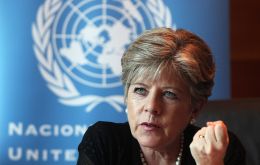MercoPress. South Atlantic News Agency
Tag: ILO
-
Tuesday, May 19th 2015 - 02:05 UTC
Latam unemployment expected to increase as economic activity weakens

The non encouraging economic outlook for the current year will likely prompt a mild increase in the regional unemployment rate to 6.2% from the 6.0% registered in 2014, according to estimates released by the Economic Commission for Latin America and the Caribbean (ECLAC) and the International Labor Organization (ILO).
-
Friday, December 19th 2014 - 08:04 UTC
CFK yearns UK 'will agree to talk about Malvinas', praises US-Cuba accord

Argentine President Cristina Fernandez de Kirchner wishes the United Kingdom would agree to discuss the issue of the Malvinas (Falklands) just like US, Cuba talked over their differences
-
Friday, June 13th 2014 - 07:51 UTC
ILO votes protocol to fight forced labor; Qatar tarnished with 2022 Cup preparations, abstains

A new global protocol to fight forced labor, adopted this week by the International Labor Organization, will accelerate action against modern slavery. The private sector is responsible for 90% of the estimated 21 million victims of forced labor, reaping some 150 billion dollars from some of the most severe forms of exploitation in existence today.
-
Thursday, June 13th 2013 - 06:59 UTC
Millions of underage children worldwide working in hazardous conditions

An estimated 10.5 million children worldwide, most of them under age, are working as domestic workers in people’s homes, in hazardous and sometimes slavery-like conditions, says the ILO. Six and a half million of these child labourers are aged between five and 14 years-old. More than 71% are girls.
-
Wednesday, April 10th 2013 - 00:21 UTC
ILO paper warns of social unrest risk in the Euro-zone as unemployment keeps climbing

Unemployment at unprecedented levels in the European Union means the risk of social unrest is on the rise says the UN's International Labour Organization Miguel Angel Malo who argues that EU politicians need to abandon austerity and embrace job creation.
-
Tuesday, January 22nd 2013 - 15:50 UTC
Global unemployment again on the rise; situation particularly bleak for youth

Global unemployment rose in 2012 after falling for two straight years and could further increase in 2013, the International Labour Organization (ILO) has warned in a new report. The number of unemployed worldwide rose by 4.2 million in 2012 to over 197 million, a 5.9% unemployment rate, according to Global Employment Trends 2013.
-
Thursday, November 15th 2012 - 19:00 UTC
Uruguayan industry criticizes imports policy, labour costs and Mercosur

Uruguay’ Chamber of Industries, CIU, criticized the ‘indiscriminate’ influx of foreign goods, labour costs and Mercosur, and called on government to change the focus of its policies towards manufacturing underscoring that the domestic market represents 55% of industries’ GDP.
-
Tuesday, November 6th 2012 - 06:28 UTC
Latam labour market ‘fairly resilient’ to the slowdown of the regional economy in 2012

According to the Economic Commission for Latin America and the Caribbean (ECLAC) and the International Labour Organization (ILO), labour markets in Latin America and the Caribbean were fairly resilient to the slowdown in the regional economy in the first half of 2012, which bodes well for a positive outcome in this year's employment and unemployment indicators.
-
Wednesday, July 11th 2012 - 22:33 UTC
ILO anticipates further job losses in Euro-zone because of austerity measures

The Euro-zone could lose 4.5 million more jobs in the next four years unless the region shifts away from austerity, the International Labour Organization (ILO) has warned. That rise would take unemployment in the 17-nation bloc to 22 million.
-
Thursday, June 7th 2012 - 20:25 UTC
“Too much financial, too little social” attention says ILO chief of the current crisis

It is possible to turn the inefficient growth patterns of today’s world economy around but this requires a redefinition of priorities and the political conviction to overcome the dogmas of the past, said ILO chief Juan Somavia, in his addess to the plenary session of the International Labour Conference.
